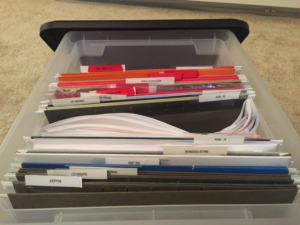 Unmanaged paperwork around your home and office can be quite stressful. Searching for important documents may seem hopeless. Interest charges and late fees can pile up quickly on misplaced bills. Deadlines are easily overlooked. Getting on top of your papers and developing a good paper management system will reduce your stress.
Unmanaged paperwork around your home and office can be quite stressful. Searching for important documents may seem hopeless. Interest charges and late fees can pile up quickly on misplaced bills. Deadlines are easily overlooked. Getting on top of your papers and developing a good paper management system will reduce your stress.
Choose a Convenient Location
Where you manage your paperwork should be convenient. Going to a secluded area of your home may not encourage you to manage your paperwork. If it is not an area you enjoy being in, you won’t go there.
The workspace should have ample surface area, basic office supplies (envelopes, pens, address label), computer and printer, paper recycle bin and paper shredder.
Remove the Unnecessary, Immediately
Sort your mail as soon as it comes in with a recycle bin and shredder within in arm’s reach. Junk mail should be recycled immediately. Refer to the document retention guideline for guidance on what documents to keep and for how long.
Do Initial Sorting
Create a temporary, simple filing system for the initial sorting of your paperwork. This file system could include files labeled:
File – for files to be filed
Pay – for bills to be paid
To Do – for items that require attention within the next month
Read – for documents that will required your dedicated attention
Regularly go through and Pay, Sort and File
Set up a weekly time to go through the temporary files. Coordinate your bill paying with your pay dates. File papers from the ‘file’ file. Review your ‘to do’ file for items needing attention within the next week. Take some time read through the files from your ‘read’ file.
Choose Physical or Electronic Files
Decide if you prefer physical or electronic files. It’s nearly impossible to completely do one or the other, but designating one or the other as your filing system will help to manage your paperwork.
It is important to always be aware of what papers, documents and receipts enter your home. Receipts can be sent via email or not retained at all. Be selective of what documents are collected at trade shows, conventions and seminars. Only accept the documents that are relevant to you. Be mindful of the mailing lists, marketing emails and promotional lists you sign up for.
Once your paperwork system is set up, plan to set aside time every week to maintain and manage your paperwork. Staying on top of your system will reduce stress and ensure you keep on top of your work and bills.
If setting up a paperwork management system is overwhelming for you, a professional organizer can help. Contact Jayme with Top Shelf Home Organizing for a consultation to see how we can help.
